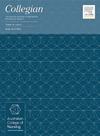印度人对可改变的缺血性心脏病风险的认识和认知:范围回顾
IF 1.7
4区 医学
Q2 NURSING
引用次数: 0
摘要
背景:缺血性心脏病(IHD)在全球范围内造成大量死亡。印度的IHD负担最高,自1990年以来病例增加了138%。印度血统的人面临早期IHD的风险更大,长期预后也更差。印度人患IHD的时间通常比其他人群早10年,与IHD相关的死亡中有52%发生在70岁之前,而西方国家的这一比例为23%。目的:本综述旨在综合有关印度人口对可改变的IHD危险因素的知识和认知的证据,并确定文献空白。方法采用乔安娜布里格斯研究所(joanna Briggs Institute, JBI)的方法和扩展范围评价的系统评价和荟萃分析首选报告项目(PRISMA)。人口、概念、背景(PCC)框架(印度人;对可改变的IHD风险的认识和认知;印度人口(全球)指导了搜索策略。数据库检索仅限于2010年至2024年以英语发表的论文。结果共纳入23项研究。大多数研究在印度进行,报告对IHD风险因素的了解程度较低,而一些国际研究显示对IHD风险因素的了解程度较高。无论在国内还是在国际上,人们对患IHD风险的认识都很低。一个主要的误解是认为个人无法控制IHD的进展和预防。结论本综述强调了印度人对IHD风险的有限认识和普遍误解,以及可改变的风险因素的重要性。此外,它为护士在为有心脏病风险的患者提供健康教育干预时提供了重要的信息。本文章由计算机程序翻译,如有差异,请以英文原文为准。
Knowledge and perceptions of modifiable ischaemic heart disease risk among Indians: Scoping review
Background
Ischaemic heart disease (IHD) causes a significant number of deaths globally. India has the highest IHD burden, with cases up 138% since 1990. Individuals of Indian descent face a greater risk of early IHD and poorer long-term outcomes. Indian people typically develop IHD a decade earlier than other populations, with 52% of IHD-related deaths occurring before the age of 70, compared to 23% in Western populations.
Aims
This review aims to synthesise evidence on the Indian population’s knowledge and perceptions of modifiable IHD risk factors and identify literature gaps.
Methods
Joanna Briggs Institute (JBI) methodology and the Preferred Reporting Items for Systematic Reviews and Meta-Analyses (PRISMA) Extension for Scoping Reviews was followed. The Population, Concept, Context (PCC) framework (Indian people; knowledge and perceptions of modifiable IHD risks; Indian population globally) guided the search strategy. The database search was limited to papers published in English language from the year 2010 to 2024.
Results
Twenty-three studies were included. Most were conducted in India and reported low knowledge of IHD risk factors, while some international studies showed higher knowledge. Perceptions of the risk of developing IHD were low both domestically and internationally. A major misconception was the belief that individuals have no control over the progression and prevention of IHD.
Conclusion
This review highlights the limited knowledge and prevalent misconceptions of Indian people about the risk of IHD and the importance of modifiable risk factors. Additionally, it provides important information for nurses to consider when providing health education interventions for patients at risk of heart disease.
求助全文
通过发布文献求助,成功后即可免费获取论文全文。
去求助
来源期刊

Collegian
NURSING-
CiteScore
2.70
自引率
6.70%
发文量
127
审稿时长
72 days
期刊介绍:
Collegian: The Australian Journal of Nursing Practice, Scholarship and Research is the official journal of Australian College of Nursing (ACN).
The journal aims to reflect the broad interests of nurses and the nursing profession, and to challenge nurses on emerging areas of interest. It publishes research articles and scholarly discussion of nursing practice, policy and professional issues.
Papers published in the journal are peer reviewed by a double blind process using reviewers who meet high standards of academic and clinical expertise. Invited papers that contribute to nursing knowledge and debate are published at the discretion of the Editor.
The journal, online only from 2016, is available to members of ACN and also by separate subscription.
ACN believes that each and every nurse in Australia should have the opportunity to grow their career through quality education, and further our profession through representation. ACN is the voice of influence, providing the nursing expertise and experience required when government and key stakeholders are deciding the future of health.
 求助内容:
求助内容: 应助结果提醒方式:
应助结果提醒方式:


